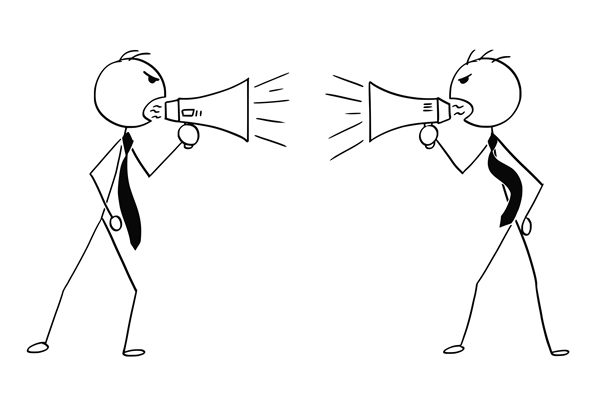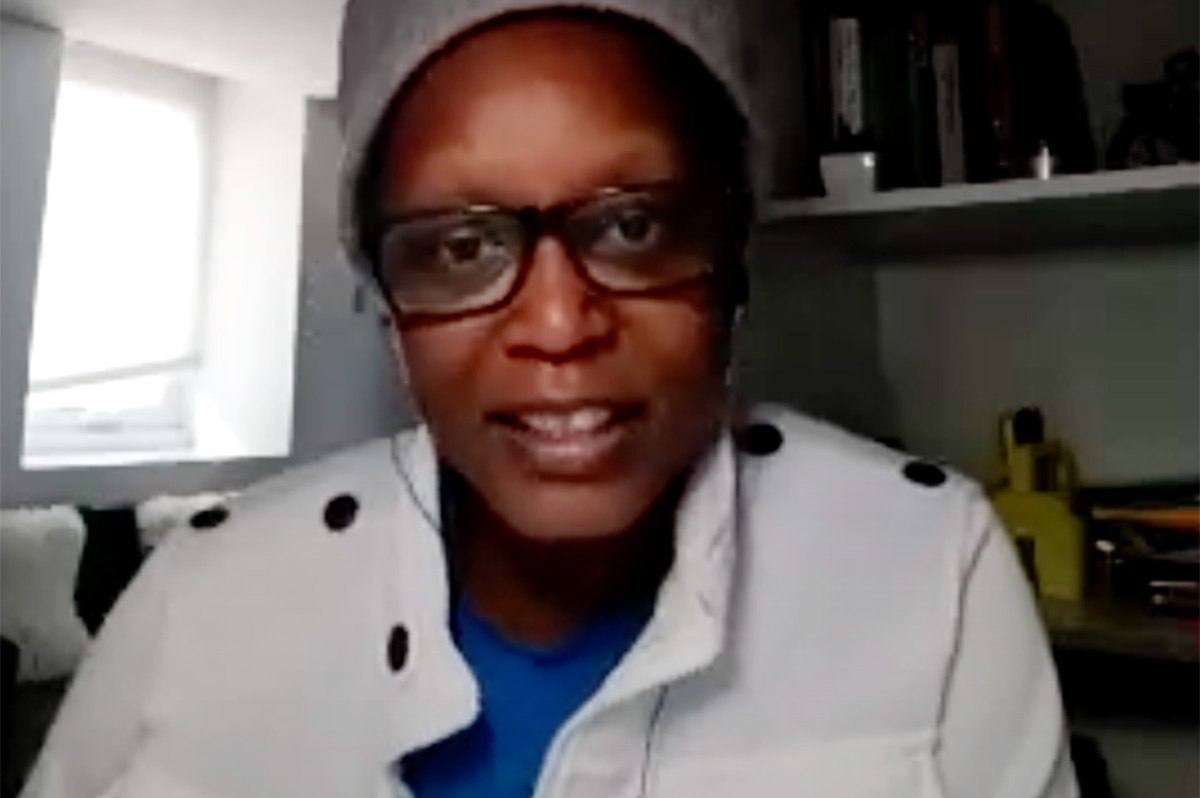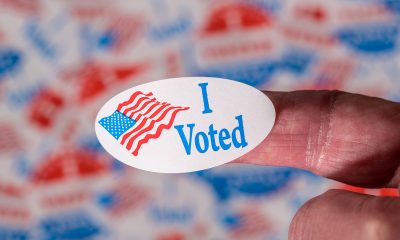Opinions
Political insanity is making us crazy
Growing estrangement from parties and increasing distrust of media is result


National politics are making us crazy.
Sensible people have simply begun blocking out the incessant screaming on the airwaves or in publications, and that’s not a positive development. It’s difficult, though, to blame anyone for doing so when personal sanity is at stake.
The rancor is a cause of the alienation between voters and parties, and is intensifying a long-festering disaffection. While political party affiliation has been declining for a number of years, the most recent Gallup national survey last month indicates only 27 percent of Americans self-identify as Democrats and only 29 percent as Republicans. A clear plurality, averaging 43 percent nationwide over the past four months of polling, identify as independents not aligned with either party.
Also significant is that nearly half of the country, comprising 47 percent of all likely voters in an annual national poll, believes neither faction in Congress is “the party of the American people.” That number is six points higher than the previous year. Only a third, at 35 percent, disagree with that assessment.
Amidst this deepening disassociation, the two major political parties have become dual sides of the same coin – either dysfunctional or dystopian. Determining which is which is now essentially nothing more than an inkblot interpretive choice among a majority.
The bulk of voters, situated at a moderate policy center both parties have abandoned, are dismayed by what is increasingly expected to be an extreme binary choice on the presidential ballot more than 14 months from now. Many worry more, however, about stabbing their eyes out long before that moment eventually arrives.
What some are touting as “the most consequential decision in history” seems to many Americans the equivalent of a massive food fight in an elementary school cafeteria. It’s a brawl that’s become starkly ugly and nasty, too.
The commonplace name-calling, invective hurling, and motive questioning of ordinary voters is now wholly pervasive. Tuning-out or shutting-up has become the preferred personal strategy for preserving internal wellbeing or protecting external reputations.
Have we really entered an era when everyone is either a racist or a socialist, or similar and worse? Are we actually neutering such disparagements and rendering them meaningless by casual application to those with whom we happen to disagree?
People don’t like being maligned as motivated by evil, particularly when the defamation is unwarranted or unjustified. It’s certainly not the route toward successfully building a coalition of the dominant disaffected.
If Democrats want to emerge victorious in an election only they could fail to win, party officials might consider dumping as much cash as it might take to convince CNN to switch to televising movies all day and night. The network, by becoming just another blatantly transparent partisan co-conspirator undermining fair-minded news delivery, is hurting more than helping. They’ve devolved, in a ratings contest for viewers, to merely mirror the longstanding opinionated ploys of oppositional FOX and MSNBC.
Political pundits, news analysts, and even the nominally objective traditional journalists across the spectrum have largely abandoned any semblance of straightforward reporting or unbiased analysis. Most humorous are those mocking the media pursuit of the next contrived rabbit unleashed – while spotting another one and immediately taking chase.
The behavior of politicians, parties, pundits, and the purported purveyors of news are discouraging engagement and are diminishing faith in the political system, news media, and civic institutions. There’s a ‘resistance’ building, but it’s one of opposing the constant barrage of barbs and slurs directed towards ordinary citizens or the casting of political aspersions and personal slanders at entire swaths of people.
The vast majority of Americans, including within the LGBT community, live outside of highly insular right-or-left bubbles reflexively seeking their next outrage “fix” like convulsing junkies.
Our national politics have become too exhausting for too many, and the continuing growth in political estrangement is the real danger to democracy.
Mark Lee is a long-time entrepreneur and community business advocate. Follow on Twitter: @MarkLeeDC. Reach him at [email protected].
Opinions
D.C. leaders must show up for LGBTQ+ communities
Silence is not an option amid relentless attacks

At a time when D.C. and the LGBTQ+ community are under relentless attack, we cannot afford silence — or inaction. The DC LGBTQ+ Budget Coalition, a grassroots alliance of more than 20 LGBTQ-led and LGBTQ-serving organizations and individuals, is calling on Mayor Bowser, the D.C. Council, and every level of D.C. government to act with urgency and purpose in this year’s budget process to invest in our community. Our lives, our futures, and our rights are on the line — not just nationally, but here at home in the District. How D.C. as a city responds in the face of hate sends a powerful message to the rest of the country.
We formed this coalition because LGBTQ+ people in the District — especially Black, Brown, trans, disabled, and low-income residents — deserve more than token inclusion. We deserve policies, investments, and leadership that center our lived realities and deliver on equity. While Congress tries to strip D.C. of home rule and holds our budget hostage, our local government has the power — and responsibility — to lead.
We are not a performative alliance. We are a community-driven movement. From housing to healthcare to workforce development, we believe budgets are moral documents — and D.C.’s budget must reflect the values of equity, justice, and liberation.
National Context Demands Local Action
Just this year, members of Congress introduced damaging legislation to reverse D.C.’s home rule, stripping District residents of the fundamental rights of self-governance enjoyed by their own constituents. Additionally, the White House seeks to rule over us by executive order, issuing edicts to overturn our laws. Adding further insult to injury, extremists in the House of Representatives are holding $1.1 billion of D.C.’s own tax revenue hostage to their radical anti-democratic agenda.
Moreover, this administration continues its assault on diversity, equity, and inclusion initiatives, undermining civil rights protections across the country. We are not simply witnessing bureaucratic shifts; we are standing at the edge of a cliff, staring down a coordinated rollback of the very protections our communities have bled to secure.
Veterans of past queer liberation fights remind us that we’ve been here before. From the Lavender Scare to Stonewall to ACT UP, from the fight for marriage equality to the ongoing battle for trans rights, queer warriors have long known what it means to survive government neglect, societal backlash, and moral panic. Their testimonies warn us: This moment is severe. This moment is familiar. And this moment requires us to act.
These are not theoretical attacks. They are strategic, structural, and escalating. In this context, D.C. must serve as a model for sanctuary, resilience, and resistance. That means investing in communities — not abandoning them.
We know that our local leadership has, at times, moved preemptively to comply with federal executive orders — even when those directives run counter to our values. And while the mayor has publicly affirmed equity, housing, and inclusivity as core priorities, this moment demands more than words. We call on the mayor and District leaders to stand firm in those stated commitments and meet this moment with the clarity in the District’s budget. D.C. must not be a conduit for federal overreach, but a bulwark against it.
Our FY26 Priorities
In this year’s budget, we’re calling for the D.C. government to protect targeted investments in:
• Public Health: Restore and expand local funding to fill the dangerous gaps left by federal cuts to HIV prevention and mental health services. Ensure culturally competent care for LGBTQ+ residents, especially those with disabilities and chronic health conditions.
• Employment and Economic Equity: Sustain and grow workforce development programs for trans and gender-diverse (TGD) residents. Expand partnerships with employers and support entrepreneurial training by and for the TGD community.
• Housing: Invest in long-term housing solutions, including for LGBTQ+ youth and seniors, and protect programs like Emergency Rental Assistance Program (ERAP) and Tenant Opportunity to Purchase Act (TOPA) that keep people residents housed.
• Safety and Community Support: Fund LGBTQ+ survivor shelters and IPV/SA services, ensure disability and language access, and streamline government grant processes for community-based organizations.
We’ve outlined these and other priorities in our full FY26 Budget and Policy Platform, recently delivered to the Mayor and D.C. Council. But we know that a letter alone isn’t enough—we must take action.
We’re Organizing — and We’re Not Alone
In this past week, we launched a letter-writing campaign to mobilize D.C. residents to urge their Council members to prioritize LGBTQ+ budget needs. We are also releasing a citywide sign-on letter for partner coalitions and ally organizations to demand the same.
Our members are showing up at budget hearings, meeting with agencies, and organizing communities across all eight wards. And while we’re proud of the momentum, we need our community to join us. We need every resident, organization, and elected leader to get in this fight.
How You Can Get Involved
Here’s how you can join the movement:
• Individuals: Sign our Action Network letter to Council members and the Mayor.
• Testify or submit written testimony at budget hearings to uplift our priorities.
• Call and email your Council members — demand full inclusion of LGBTQ+ needs in the FY26 budget.
Together, we can ensure that D.C.’s budget reflects the lived realities and urgent needs of LGBTQ+ communities across all eight wards.
The question before D.C.’s leaders is clear: Will you choose to look the other way or will you join us in taking action?
Heidi Ellis is coordinator of the DC LGBTQ+ Budget Coalition. Erin Whelan is executive director of SMYAL (coalition member).
Opinions
LGBTQ elder voices matter now more than ever
Global Story Archive highlights often ignored perspectives

Kasha Nabagesera is widely regarded as the Mother of the Ugandan LGBTQ+ human rights movement. As one of the most prominent human rights activists of our time, she is no stranger to speaking publicly about her life. However, when I had the privilege of sitting down with her this February, she opened up about a part of her story that is often overlooked—or, even worse, ridiculed. Aging.
When Kasha turned 40, she began to notice a shift in how people viewed and spoke about her lived experience. In the years since, she has received hurtful and dismissive messages from younger LGBTQ+ people who believe her age renders her opinions and perspective irrelevant. These individuals fail to recognize that the sacrifices made by Kasha and other elders have paved the way for today’s young queer people to live their lives openly and proudly.
Disregard for LGBTQ+ elders is not just disrespectful—it’s a missed opportunity for connection at a time when solidarity among LGBTQ+ people is desperately needed. The number of anti-LGBTQ+ bills continues to rise in state legislatures across the U.S., and about one-third of the world’s countries, including 60 UN member states, still criminalize consensual same-sex sexual acts.
The reality is that our elders are true pioneers of the LGBTQ+ movement worldwide. They have survived decades of discrimination and state-sanctioned violence, leading them to face many unique challenges.
Many report having to “go back into the closet” to access care in later years, lack family support networks, and discrimination in housing and healthcare. LGBTQ+ older adults are also less likely to have retirement savings due to decades of employment discrimination.
Through these struggles, LGBTQ+ elders have developed remarkable wisdom, and their lived experiences can provide a roadmap for resilience in the face of new obstacles. But too often, we fail to listen to them, and their contributors are forgotten.
Over the last three and a half years as director of International Programs at SAGE, I have spoken with hundreds of elders worldwide about their lives and legacies. Most have shared similar experiences of ageism and a desire to pass on their knowledge to younger generations.
One of those elders is Reingard Wagnar, a 74-year-old lesbian and activist from Germany. She said that not only are older women in society rendered invisible anyway, but it is especially true for older lesbians. She wants people to know that elder LGBTQ+ folks are here, and they have much to share.
Another elder I had the honor of meeting, Kevin Mchawiro, is a Kenyan journalist and believes stories can also serve as a source of inspiration and that love does indeed win.
To collect, preserve, share and amplify the stories of elders like Kasha, Reingard, and Kevin, I created The Global Story Archive. Supported by SAGE and in collaboration with a global network of not-for-profit organizations and independent activists, this first-of-its-kind collection features the voices of dozens of LGBTQ+ elders who are eager to share their perspectives across generations and borders.
However, in the wake of Trump’s Executive Orders on Foreign Aid, the uncertainty of where funding and support lies, and what the future looks like, SAGE must close its global operations. This suspension is happening in tandem with the dismantling of foreign aid programs that advance the well-being of other underserved populations, including immigrants, women, and those burdened by disease.
The loss extends beyond funding cuts or policy shifts; it represents the erosion of programs that have fostered solidarity and advanced the well-being of us all.
If you find yourself asking how to find resilience in this turmoil, the answer is simple: look to our elders. Our international community of LGBTQ+ elders has lived through and witnessed moments of upheaval, tragedy, and triumph, and they hold priceless knowledge to counsel younger generations through hardship.
The state of the world is uncertain, but as elders will tell you, it can get better.
To hear and learn from the voices of our global community of LGBTQ+ elders, please visit The Global Story Archive.
Hannah Yore is an international health and human rights advocate with expertise in aging, care work, and LGBTIQ human rights. She is the former director of International Programs at SAGE and is a dedicated palliative care and end-of-life doula.
Opinions
It’s time for new leadership on the Maryland LGBTQIA+ Commission
TDOV stunt disrespected Gov. Moore and his record of trans support

On March 31, what should have been a day of collective celebration and power for Maryland’s transgender community, Transgender Day of Visibility was instead hijacked by public hostility toward Maryland Gov. Wes Moore. The verbal attack was out of line, disrespectful, and did nothing to move us closer to justice. FreeState Justice did not applaud. We did not stand. We know the difference between holding power accountable and performing outrage without an actionable plan.
Let’s be honest: the Moore-Miller administration and the LGBTQIA+ legislative caucus have shown up for our community in ways that matter. From the signing of the Trans Health Equity Act to the launch of the first-in-the-nation ‘Trevor Train the Trainer’ suicide prevention initiative with The Trevor Project, a program that equips individuals to train others in suicide prevention techniques, this administration has made meaningful, measurable investments in the lives of LGBTQIA+ Marylanders.
The Governor’s proposed FY26 budget didn’t just protect access to gender-affirming care—it doubled on hate crime prevention and increased support for community centers doing the work. This is what leadership looks like. It’s not just symbolism—it’s dollars, policy, access, and intention. And it bears repeating: Gov. Wes Moore is the first Black governor of Maryland. His leadership holds particular significance for those of us who live at the intersection of racial, gender, and queer identities. Understanding intersectionality is not optional—it is essential if we are serious about liberation for all LGBTQIA+ people, especially those who are Black, Brown, and historically marginalized.
What we experienced on March 31 was the opposite. It was disorganized, divisive, and frankly, disappointing. FreeState Justice has not had a working relationship with the current Maryland Commission on LGBTQIA+ Affairs, a body that is supposed to represent and advocate for our community’s needs. The Commission has not come to the table with a legislative or budgetary request. There has been no coordinated policy agenda. There has been no coalition-building. There has been no community-informed process. That matters.
If your goals are equity and inclusion, your work must be transparent and collaborative. Not ambush tactics like sudden changes in event format or last-minute planning that leave key stakeholders out of the loop. The TDOV event, coordinated by the Commission and a few community members at the eleventh hour, lacked the strategic groundwork our community needs and deserves. It was self-serving and dishonest.
It’s particularly disheartening to contrast this with what we accomplished two years ago when the governor made history by recognizing Transgender Day of Visibility inside the State House. He led the charge. We were proud to stand with him then—and we still are.
We honored a moment that acknowledged not just trans identity, but also racial equity and our collective history of struggle. To witness that same governor, who had previously met with this Commission openly and respectfully, be publicly ridiculed without acknowledgment of his administration’s historic support was a failure of leadership—not on his part, but on those who opted for conflict instead of fostering community.
Let’s be clear: we’re not saying don’t challenge power. We’re saying do it with purpose. Do it with facts. Do it with a strategy. If you’re going to call yourself a leader in this movement, show us the policy platform. Show us the data. Show us the budget line. Show us the work.
At FreeState Justice, we’ve done that, and we will continue to do that. We’ve applied—and will keep applying—for state dollars through the Governor’s Office of Crime Prevention, Youth, and Victim Services. Why? Because those grants help us serve survivors of domestic violence, LGBTQIA+ youth, victims of hate crimes, and people impacted by community violence. Many of whom are people of color. This is where real change happens—at the intersection of advocacy, accountability, and access.
It’s time for new leadership on the Maryland LGBTQIA+ Commission. Leadership that values and prioritizes coalition over conflict. Leadership that invites feedback and shares power. Leadership that understands how Annapolis operates, how budgets are constructed, and how community victories are won—not demanded. The urgency for this change is palpable and should resonate with everyone who cares about our community.
We know the stories. We know the statistics. Now we need a Commission willing to put in the work with all of us—not just a chosen few. This collective effort is crucial for the progress of our community and should be felt by all who are part of it.
Maryland’s transgender community deserves more than fleeting moments; we deserve ongoing movement.
Lauren Pruitt is legal director of FreeState Justice; Ronnie L. Taylor is the group’s Advocacy, Policy, & Partnerships Director.
-

 District of Columbia5 days ago
District of Columbia5 days agoWorldPride organizers may warn trans people from abroad not to attend event
-

 Opinions4 days ago
Opinions4 days agoIt’s time for new leadership on the Maryland LGBTQIA+ Commission
-

 The White House3 days ago
The White House3 days agoWhite House does not ‘respond’ to reporters’ requests with pronouns included
-

 Noticias en Español4 days ago
Noticias en Español4 days agoINDIGNACIÓN: ¡El transfeminicidio de Sara Millerey en Colombia nos cuestiona como sociedad!












